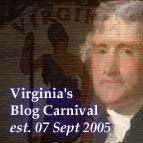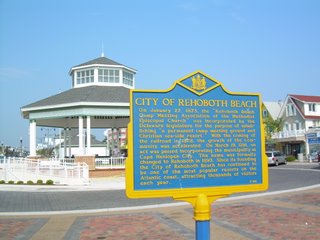
It's been a big week for me to interact with Thomas Jefferson. On Tuesday
I visited Monticello. I also wrote about the
Declaration of Independence.
Now today, I attended a
book forum hosted by the Cato Institute, featuring the editor of a new book from Princeton University Press called
The Quotable Jefferson. The editor, John P. Kaminski, is the founder and director of the Center for the Study of the American Constitution in the Department of History at the University of Wisconsin, Madison. Kaminski’s remarks were followed by a response by
Matthew Spalding, director of the
Center of American Studies at the Heritage Foundation.
The panel was moderated by
John Samples, director of Cato’s
Center for Representative Government, who pointed out that
The Quotable Jefferson is “priced very nicely [listed at $19.95, but $13.57 on Amazon] for such a substantial book.” He described it as the “most comprehensive and authoritative collection of quotations” of Thomas Jefferson.
That should come as no surprise, given the editor’s background and experience. “I have known Mr. Jefferson for a long time,” he said, noting that he once introduced himself to an audience by saying “I’ve been living in the 18th century for the last 35 years.”
Kaminski is involved in
a major project to gather together all of the surviving documents related to the ratification of the Constitution, a project that so far has lasted 50 years with a resulting 19 volumes, and he predicted it will continue for at least another 15 years (for a total of 65) before it is completed. There are 100,000 documents from the ratification period, he said, which need to be gathered, transcribed, and catalogued. It is taking 65 years to document “what the Framers did in four months [of drafting the Constitution] and the American people did in nine months [of debating ratification state-by-state],” he said.
Thomas Jefferson, Kaminski said, is among the “most widely quoted, most admired, and most condemned” figures of U.S. history. “Jefferson runs hot and cold throughout our history,” he remarked, and “today both spigots are on.” The reason for this bipolar approach is that Jefferson, unlike some of his contemporaries (such as James Madison) wrote down just about every thought he had, leading to contradictions, extremes, and positions easily taken out of context.
Another aspect of Jefferson’s writing, besides its voluminousness, is that he “is more interested in style and how a sentence sounds” than he is in adhering to convention or the accepted rules of grammar. Consequently, his writing has a poetic quality that creates a certain agelessness.
Kaminski asserted that “the single most important sentence in the English language was written by Jefferson,” the one beginning “We hold these truths to be self-evident…” Those words, he said, and what Jefferson did with the rest of the Declaration of Independence, were the consummation of taking all of what had been written in the 18th century about political theory and governance – some 23,000 pamphlets in the English-speaking world, and some 5,000 pamphlets in North America in the years leading up to the American Revolution. Jefferson condensed all that thought into a few hundred words that come down to us as the Declaration. (And, I might add, how many of us can name, much less quote, any of those 23,000 pamphlets?)
The words, Kaminski said, are “Jefferson’s legacy.” He was an imperfect human being, as were all the Framers (and as are politicians today), but the words are what last and what have had the greatest impact, regardless of what one might think about Jefferson’s personal life or his personal decisions about, for instance, his slaveholding.
Closing his initial remarks, Kaminski told the 65 or so audience members gathered in Cato’s Hayek Auditorium that what he hopes “you’ll get from the book is the joy and pleasure and sense of edification from someone who writes poetically.”
In his response, Matthew Spalding acknowledged that his expertise lies more with the life and thought of George Washington than it does with Jefferson, but he said that “it is always a good thing to focus on the American Founders” and that “biography is in many ways the best way to teach history.”
Spalding said that, “when it comes to his political thinking, we have to grapple with the fact that Jefferson is the most difficult founder to deal with.” There is often a distraction, he said, stemming from Jefferson’s hyperbolically revolutionary rhetoric and his flirtations with the excesses of the French Revolution.
(Later in the program, Professor Kaminski mentioned the “Adam and Eve letter,” in which Jefferson suggested that democracy would be served well if, in every country, revolution killed off everyone except for one pair, an “Adam and Eve,” to restart society from scratch. That text reads, as recorded in
The Quotable Jefferson on page 120:
[Speaking of the French Revolution] In the struggle which was necessary, many guilty persons fell without the forms of trial, and with them some innocent. These I deplore as much as any body, & shall deplore some of them to the day of my death. But I deplore them as I should have done had they fallen in battle. It was necessary to use the arm of the people, a machine not quite so blind as balls and bombs, but blind to a certain degree. A few of their cordial friends met at their hands the fate of enemies. But time and truth will rescue & embalm their memories, while their posterity will be enjoying that very liberty for which they would never have hesitated to offer up their lives. The liberty of the whole earth was depending on the issue of the contest, and was ever such a prize won with so little innocent blood? My own affections have been deeply wounded by some of the martyrs to this cause, but rather than it should have failed, I would have seen half the earth desolated. Were there but an Adam & Eve left in every country, & left free, it would be better than as it is now. --To William Short, Philadelphia, January 3, 1793.)
Spalding explained that various figures of the revolutionary and constitutional eras influenced and balanced each other. Madison, in particular, served as a moderating influence on Jefferson, stressing the importance of constitutional structures as opposed to revolutionary rhetoric. Spalding posed the question: “Does Jeffersonianism need to have Madisonianism or Hamiltonianism or even Washingtonianism?” He pointed out that, by putting the rivals Jefferson and Hamilton in his Cabinet, George Washington forced the two of them to work out their differences, moderated through constitutional structures. Both Hamilton and Jefferson, he said, needed to moderate the extremes of their rhetoric.
Summarizing Jefferson’s contribution to the “American argument,” Spalding pointed to the three things listed on Jefferson’s tombstone:
First, individual rights: The most important sentence for the American experiment, he said, begins with “All men are created equal.” Here is where the contradictions come in, because that “evocation of rights has to be squared with Jefferson’s ownership of slaves.” Yet those words became the “promissory note” that was redeemed through abolition and eventually through the civil rights movement of the 20th century.
Second, religious liberty: Jefferson and Madison, Spalding said, were the most vigilant of the Founders when it came to protection of religious liberty, which they recognized as the “cornerstone of every other liberty.”
Third, education: Spalding cited three components of Jefferson’s views of education – that there should be universal education across the board, at all levels, that there should be an emphasis on civic education, including teaching about rights and democracy, and that education includes higher education, concretized in Jefferson’s founding of University of Virginia. In all cases, Jefferson felt that education was a responsibility of government, that government should provide public education.
Spalding argued that, up until the Civil War, the centerpiece of American historiography was George Washington. After the Civil War, as Washington lost some luster, there was a greater emphasis – a greater debate – about other Founders, most especially Jefferson and Hamilton. Later leaders, such as Woodrow Wilson and Franklin Roosevelt, would invoke Jefferson in promoting their own policies. In the process of this Progressive use of Jefferson, however, the focus on rights and rights rhetoric was lost. Consequently, the recovery of the principle of rights is central to the recovery of limited government.
During the question and answer period, Spalding noted how remarkable it is that, in the United States, political debate almost always turns on what the Founders might say about this or that issue. That is why, he said in response to a question about “false quotations” attributed to Jefferson and others, people are willing to make things up and put them in the mouths (or pen) of Jefferson or Tocqueville or other respected writers of that earlier era.
Cato’s executive vice president,
David Boaz, asked, “What does it mean to be a conservative in a country founded in a liberal revolution?” Spalding replied that “it means conserving the liberal principles of the founding, principles about rights that are moored in human nature and moderated by constitutionalism.” He pointed out that the American conservative defends the “modern Enlightenment” as exemplified by Adam Smith, not the “radical Enlightenment” of Rousseau, Hegel, and later German philosophers.
Since the end of the forum, I have had an opportunity to leaf through
The Quotable Jefferson, which looks to be an excellent reference book, owing in no small part to its extensive and detailed index, which runs to 38 pages, and a listing of all of Jefferson’s correspondents and brief descriptions of each (itself 17 pages).
The quotations are divided into categories, such as “Agriculture,” “Food and Drink,” “Freedom and Liberty,” “Life’s Difficulties,” “Slavery,” and “Women.” There are special chapters with Jefferson’s descriptions of other Founders, the Founders’ descriptions of Jefferson, and Jefferson’s descriptions of himself. John Kaminski has provided a succinct introduction that sets the context and chronology for the quotations.
Any writer who uses other, more general collections of quotations as a ready reference will find this book just as useful, and libertarian writers may find it even more useful than
Bartlett's.
All in all, I’m glad I made the trip from Charlottesville to Washington for the event – more glad, I suppose, than Mr. Jefferson ever was when faced with the same journey.























